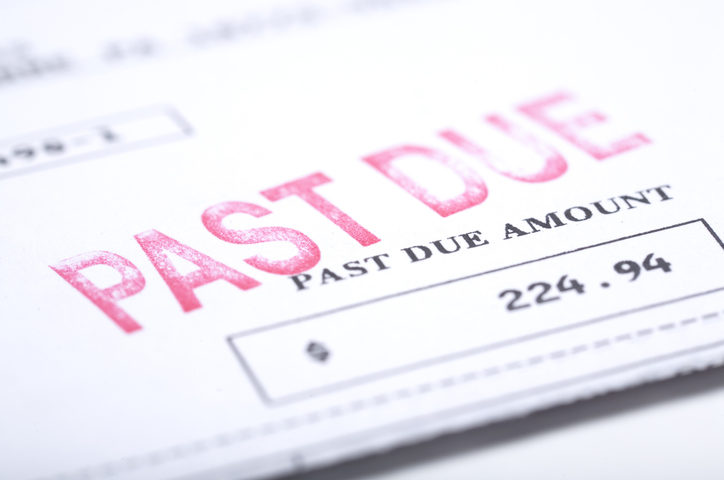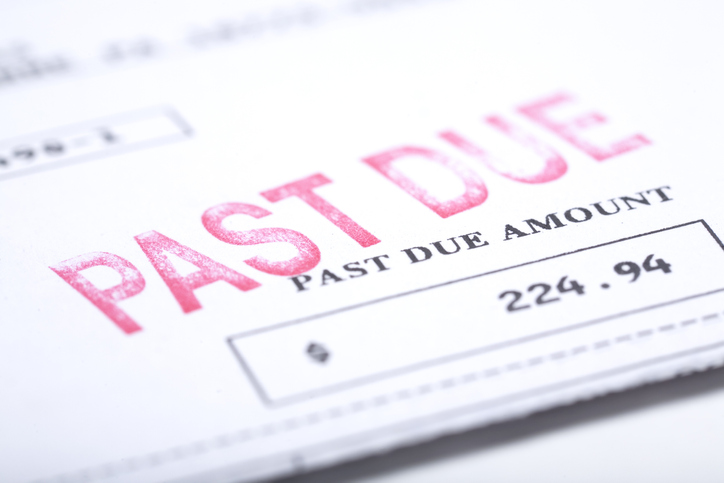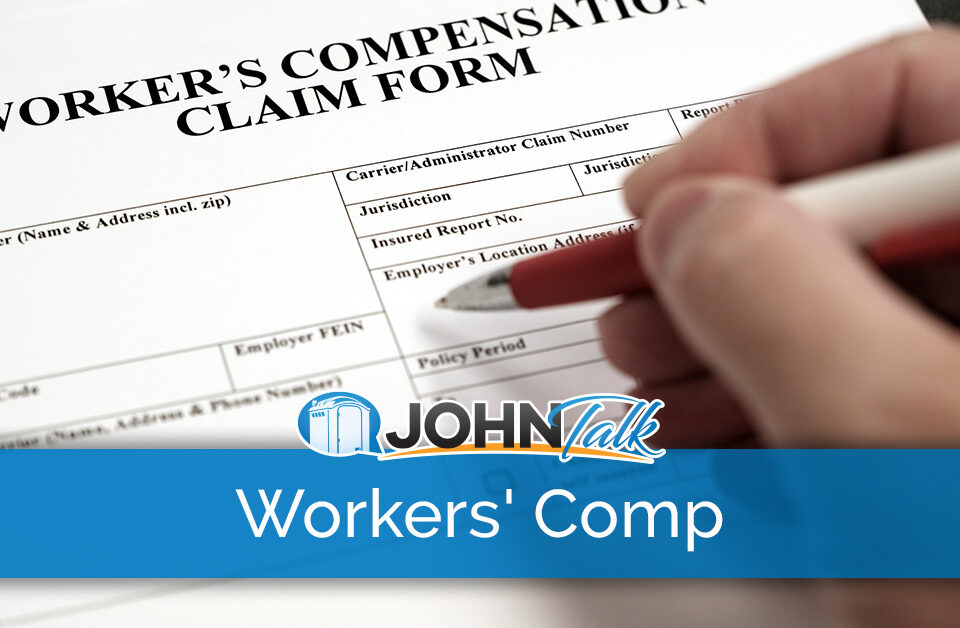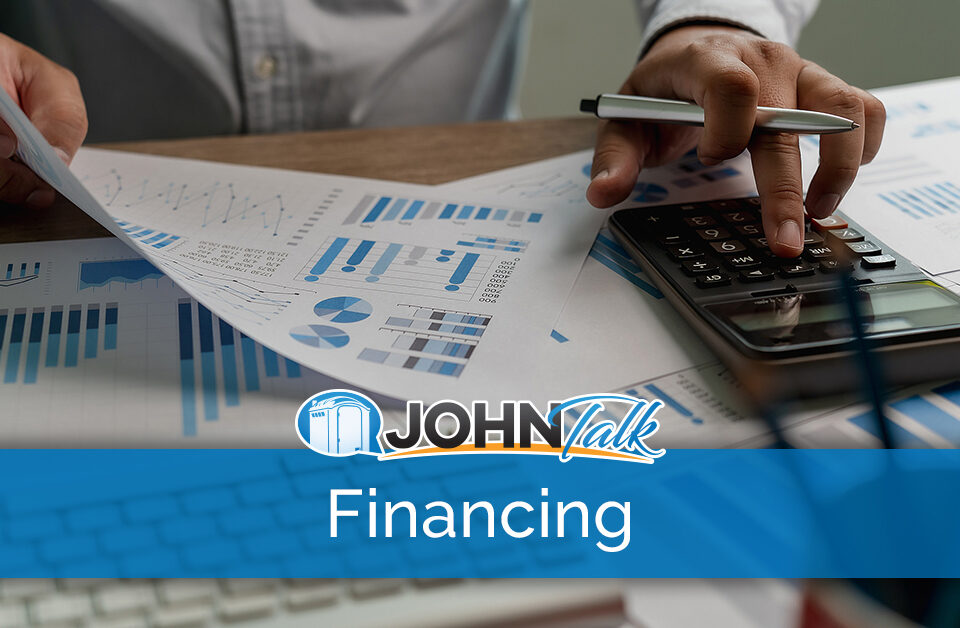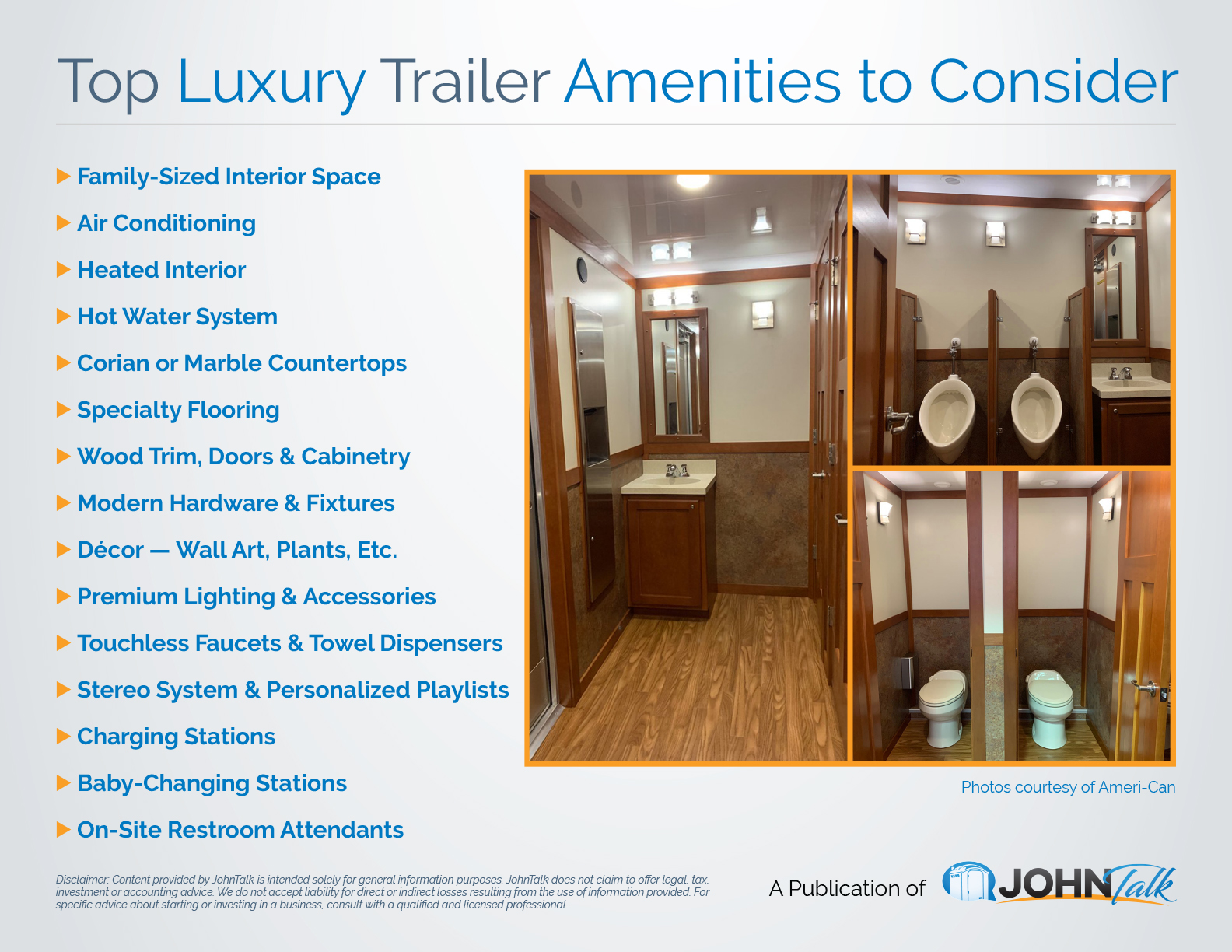
INFOGRAPHIC: Top Luxury Trailer Amenities to Consider
August 19, 2019
How to Maximize Your Company’s Opportunities During States of Emergency
September 2, 2019In many people’s opinions, portable sanitation is one of the most unappealing jobs in the work world. Yet, PROs tackle this career with gusto and a sense of humor.
But do you know a job that even seasoned PROs often don’t want to touch? Collecting an overdue debt from a customer that won’t pay – especially if the legal system has to be involved.
If there was a beginner’s class in portable sanitation school called “Getting Paid,” the first lesson you would learn is to get paid upfront for personal events such as weddings and parties. The second lesson would be to bill construction site services for the month ahead, not the one just finished.
But most large events and projects pay after the completion of services. And sometimes, they don’t pay after the completion of services. That’s when the collection process begins.
According to Nolo, there are three types of customers that you will have trouble collecting from:
- Customers who want to pay but can’t do it on time
- Customers who delay or juggle payments
- Customers who avoid paying
In the first two instances, you can often work with the customer to arrange a payment plan. You don’t have to use arm-twisting tactics. By giving the customer some wiggle room to make good, you can end up with a stronger customer relationship than when you started.
The customers who simply stonewall when payments are due are the real challenge. The only way to succeed usually involves the help of attorneys or the courts.
We’ve covered the basics of collecting in earlier posts here and here.
Let’s now look in more detail at the aspects of collecting that involve the legal system and how they offer both advantages and disadvantages. We’ve included information on collection agencies as well.
Disclaimer: Content provided by JohnTalk is intended solely for general information purposes. JohnTalk does not claim to offer legal, tax, investment or accounting advice. We do not accept liability for direct or indirect losses resulting from the use of information provided. For specific advice about starting or investing in a business, consult with a qualified and licensed professional.
Creditors’ Rights/Collection Attorneys
When your collection efforts aren’t effective, or at any time you feel like you’re in over your head when it comes to collecting debts, you may want to seek the professional advice of a creditors’ rights or collection attorney.
A creditors’ rights/collection attorney is a lawyer who protects the right of creditors to collect debts from individuals or businesses. They have the experience and understanding of the legal system as it applies to debt.
According to FindLaw, this specialist can assist you by:
- Explaining the debt collection process
- Answering debt-related questions
- Writing debt collection demand letters
- Offering solutions that are personalized to your case
- Helping you decide if hiring a collection agency or filing a lawsuit is appropriate
- Helping you collect on any judgments
Consider whether the amount you’re collecting is worth the expense of hiring an attorney. They will either charge an hourly rate or a contingency fee (a percentage of the amount you win if you file a lawsuit) for their services.
Establishing a good relationship with a creditors’ rights attorney can serve you well throughout your career. Research attorneys thoroughly, starting with these tips:
Network for referrals
Ask your professional colleagues for recommendations. Your Chamber of Commerce is a good start. Use social media to get recommendations from other PROs who have used a local collections attorney or law firm.
Check the attorney’s or firm’s credentials
You can begin with the Better Business Bureau. FindLaw recommends other methods to research a particular attorney:
1. State Bar Association directory – Every lawyer who is licensed to practice law in your state must be listed in the State Bar Association’s directory. The profile will include contact information, whether the attorney can actively practice law, and any ethical trouble he or she may have gotten into.
2. Google/search engines
3. Yelp
4. The attorney’s website
Meet with the attorney
Interview prospects. Prepare some questions, such as:
- What kinds of debt collection do you handle?
- How many years has your practice handled debt collection?
- What size debt are you willing to collect?
- What are the different ways I can collect my debt?
- How much will your legal services cost?
Small Claims Court
You’ve made an honest attempt at collecting. You’ve phoned, sent emails and letters, with zero results. You can step up your efforts and put the weight of the legal system behind you by taking your customer to Small Claims Court.
The Small Claims Courts were created to give citizens a quick, uncomplicated and reasonably priced way to bring a lawsuit. You don’t have to hire an attorney. In fact, some states don’t allow you to. In other states, you may hire an attorney if you want; however, you will usually have to pay your own legal fees even if you win.
For basic information about the small claims court system in your state, the National Center for State Courts provides a webpage listing of state court websites.
The Small Claims Process
Small claims is a fairly easy process. You (the “plaintiff”) fill out a simple complaint form, called the “statement of claim.” In it, you state why your customer (the “defendant”) owes you money and the dollar amount you’re suing for. You may also be asked to describe the evidence you plan to present. This is done at the county clerk’s office. There is a filing fee (usually from $15 to $100). Ask the county clerk if you can add the fee to the amount you’re asking for.
It’s necessary to send your claim to the defendant. Usually, the county clerk can “serve the papers” by sending them via certified mail. There is a small fee for this service that you can recover from the defendant if you win. Occasionally, it may be necessary to serve the papers in other ways. The clerk can help you with this process.
The defendant has a certain amount of time to respond. Often, the threat of legal action will persuade the customer to pay you. If the customer doesn’t respond at all, you may petition the court for a default judgment, which means you automatically win. Or, the customer may file a counterclaim, in which case you file a response and go to trial.
During the trial, both sides tell their side and present evidence to the judge, who will then make a decision. You want to explain your claim in plain language and present any documents and other evidence. You are allowed to call witnesses to back up your claim.
Collecting Your Claim
If you win your case in small claims court, you have to collect the money you are owed. The court can’t do it for you. Usually, faced with a legal decision against them, the customer will pay. If not, there are options, such as wage garnishment or taking the money from personal assets such as bank accounts. Contact the sheriff or marshal’s office in your area for more information. Again, a collections attorney can advise you.
Get the JohnTalk “ALL-ACCESS PASS” & become a member for FREE!
Benefits Include: Subscription to JohnTalk Digital & Print Newsletters • JohnTalk Vault In-Depth Content • Full Access to the JohnTalk Classifieds & Ask a PRO Forum
Collections Agencies
Turning over your debt to a collection agency is often considered a last resort because an agency usually pays about 50% or less of the amount it recovers, and it may not collect the total amount. However, it may be the best alternative when all else has failed.
It’s likely that when you are owed money, it will be from another company, such as a contractor, and not an individual, so let’s focus on using a commercial collection agency. A commercial collection agency is a third-party contractor that specializes in recovering business-to-business (B2B) debt.
There are advantages to hiring a collection agency. They are experts at recovering money. They are familiar with laws and regulations dealing with debt collection. And they take on the stressful burden of debt recovery, freeing you to focus on your business.
When to contact a collection agency
The Commercial Collection Agency Association (CCAA) suggests that you should consider hiring a collection agency when an account is 120 days delinquent (90 days after the invoice date). There are also some warning signs that may prompt you to contact an agency earlier:
- Two or more broken promises of payment
- Telephone is disconnected
- The customer repeatedly requests documentation even though you’ve sent it previously
- The customer doesn’t adhere to your terms of sale. For example, they say they pay bills in 90 days and not what was agreed upon.
- Your customer says they can’t pay and won’t provide a specific date for payment or to set up a payment schedule
- Your customer suddenly disputes the service or terms of sale
Choosing an agency
Choosing a collection agency is similar to choosing a creditors’ rights attorney. Research thoroughly. You should network for referrals from other PROs and businesses that have used collection agencies, as well as your Chamber of Commerce. Check with the Better Business Bureau on the company’s standing. The agency you hire should be licensed and insured in your state.
Dun & Bradstreet’s receivable management services and other large firms such as Transworld Systems and I.C. System offer debt collection.
Bankruptcy
The most challenging (and often frustrating) situation you can face when trying to collect a debt is when your customer declares bankruptcy.
Bankruptcy is a legal process for liquidating a business that can’t pay its debts. A company can declare bankruptcy (voluntary bankruptcy) or the court can order it (involuntary bankruptcy). Bankruptcy is meant to help companies and individuals get a fresh start while settling the legal claims of the debtors in the fairest way possible. All bankruptcy cases are handled in federal courts under the rules of the U.S. Bankruptcy Code.
Should one of your customers declare bankruptcy, it will almost certainly be a business (such as a contractor) and not an individual. Businesses file bankruptcy under Chapter 7 or Chapter 11 of the Code. In Chapter 7, the business is closing permanently and selling off its assets. In Chapter 11, the business is trying to reorganize and get back on its feet. Most business bankruptcies are Chapter 7.
Giving Priority to Claims
When a company declares bankruptcy, it’s usually because it owes a lot of money to several creditors like yourself. When many debtors are making claims against a company, they have to be put in order of importance.
Your “claim” is the amount you are owed. There are two types of claims: secured claims and unsecured claims. A secured claim is a debt in which the borrower has put up collateral (an asset) that the creditor can sell if the borrower can’t pay back the debt. An unsecured claim doesn’t have this guarantee of repayment. Your claim will most likely be unsecured.
The challenge for the PRO is that secured claims get priority over unsecured claims. You probably won’t be high on the list for collecting.
Your Part in the Bankruptcy Process
Here is the typical situation. You’ve been trying to collect money that is owed to you. You’ve made a few calls, sent reminder letters, perhaps hired a collections attorney or even a collection agency. Then, you receive a Notice of Bankruptcy Filing from the court that states your customer has filed for bankruptcy and lists your company as a creditor.
Or, you may not receive a notice, but you’ve heard that the company has filed for bankruptcy. You (or your attorney) check it out. You find that they did file but didn’t list you as a creditor.
What are your next steps?
Many businesses simply give up the claim and write off the bad debt. But FindLaw recommends that you stay with the process until you can decide if it’s worth your time to try to collect. Staying active in the bankruptcy can increase your chance of recovering at least some of the money you are owed. Inc., FindLaw and other legal websites offer several recommendations.
- The first thing you must do is to immediately stop all collection efforts. Do not contact the customer.
This is required by bankruptcy law.
- Read the bankruptcy papers
The court papers contain valuable information such as the type of bankruptcy, the deadline to file a proof of claim, and the time and place for the meeting of creditors with the debtor. The paperwork will list the creditors and whether their debts are secured or unsecured. You can use this information to decide whether to continue or take the loss. Keep in mind, many creditors don’t bother following up, so you might be in a better position than you think.
- File a proof of claim
The proof of claim states that you want to be part of the bankruptcy procedure. It’s a simple, one-page form that you can download from the US Courts website. You should attach any documentation that is evidence of your claim, such as a contract. The filing fee is about $20.
- Meet the customer/debtor
You will be able to meet with the debtor, other creditors, and the trustee appointed by the court to administer the bankruptcy at the “341” creditors meeting (named for section 341 of the bankruptcy code). You can ask questions, gather information about a repayment plan, and make an objection if you believe you aren’t being treated fairly.
- Attend the bankruptcy hearing and/or follow the bankruptcy filing
FindLaw recommends attending the hearing, especially if your customer has filed for Chapter 11. You may be asked to propose a repayment plan. You can also stay current on proceedings by using Public Access to Court Electronic Records (PACER), providing online access to information from the bankruptcy courts.
- Be patient
The bankruptcy process will generally take several months, as the trustee will oversee the distribution of assets after the bankruptcy sale (Chapter 7) or the repayment plan (Chapter 11). If you have any questions or other issues, contact the trustee. Do not contact the customer.
If you still have units or other equipment at your bankrupt customer’s site, talk to your attorney or the trustee before committing to any action.
Disclaimer: Content provided by JohnTalk is intended solely for general information purposes. JohnTalk does not claim to offer legal, tax, investment or accounting advice. We do not accept liability for direct or indirect losses resulting from the use of information provided. For specific advice about starting or investing in a business, consult with a qualified and licensed professional.
Looking to Take Your Portable Restroom Business to the NEXT LEVEL? Download our FREE Guide: “Your Guide to Operating A Portable Restroom Business.”
Thinking About GETTING INTO the Portable Restroom Industry? Download our FREE Guide: “Your Guide to Starting A Portable Restroom Business.”


